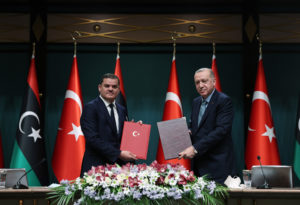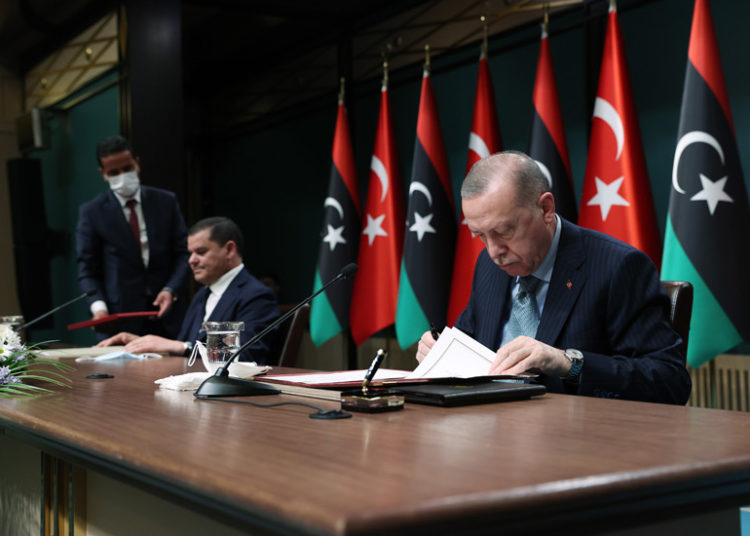Abdullah Bozkurt/Stockholm
Turkey has inched closer to implementing last year’s agreement with Libya on cooperation in the field of hydrocarbons in the North African state, which prompted criticism in Libya and abroad, especially by Greece and Egypt.
The agreement, drawn up in the form of memorandum of understanding (MoU) and signed on October 3, 2022, was sent to parliament for approval by Turkish President Recep Tayyip Erdoğan on January 10, 2023. Three days later, the parliament speaker sent it to the Foreign Affairs Committee for consideration and likely approval.
“With the said memorandum of understanding, the development of scientific, technical, technological, legal, administrative and commercial cooperation between the two countries in the field of hydrocarbons is encouraged, and joint projects such as the development and use of hydrocarbon resources and the research, development and production of land and sea resources of the two countries are carried out. It aims to increase the existing cooperation with these steps,” Erdoğan said in his letter to parliament, explaining the importance of the agreement.
“In addition, the importance of the cooperation between the parties and the national oil companies is emphasized once again,” he added.
Turkish President Erdoğan’s letter on the MoU between Turkey and Libya:
The deal is expected to clear both the committee and the general assembly with no problems and and will soon be signed into law by Erdoğan.
The four-page agreement, obtained by Nordic Monitor, specifically aims to promote joint work by state oil and gas companies in exploiting hydrocarbon resources in Libya. The Turkish Petroleum Corporation (Türkiye Petrolleri Anonim Ortaklığı, TPAO), the national oil company of Turkey, will be the leading actor in implementing the agreement, while the Libyan National Oil Corporation (NOC) is committed to facilitating the cooperation not only in the sea but also on land.
The scope of the agreement is quite broad and includes some provisions that remain ambiguous. It covers not only existing hydrocarbon fields for exploitation but also future fields on land or offshore, according to Article 2, which covers forms of cooperation.
The Turkish Petroleum International Company (TPIC), a subsidiary of TPAO that operates in all areas of the oil industry, was also named in the agreement. The paragraph that mentioned TPIC makes reference to unspecified entities that both sides may later decide to include in the cooperation scheme.
The English text of the 2022 MoU on hydrocarbons between Turkey and Libya:
“The Parties agree to encourage cooperation between Turkish Petroleum Intemational Company (TPIC) and/or by the entities designated by the Parties through diplomatic channels in the fields of trade of oil and gas, petrochemicals and petroleum products,” says the sixth paragraph of Article 2.
That means President Erdoğan, known for his blatant abuse of such agreements to enrich himself and his cronies in shady business deals, will have a free hand in designating companies, contractors and sub-contractors in executing the MoU with the Libyan state oil company.
TPAO had some project work in Libya in the past and even established a subsidiary, TP Libya Ltd., in May 2013, which ceased operations in August 2014 because of turmoil in the country. It was liquidated in November 2016, and the TPAO branch office in Libya was shut down in April 2017. With the new MoU, TPAO is set to return to Libya, perhaps with more political backing from both Turkish and Libyan officials.
Turkey also included the state-owned Turkish Pipeline Corporation (BOTAŞ) in the agreement, which guaranteed that both countries would support projects by BOTAŞ including consortiums in which it’s involved. The same trick is played in this provision as well by adding a reference to unnamed “entities designated by the Parties through diplomatic channels.” The ambiguity paves the way for the Erdoğan government to expand the agreement without bringing any amendments to parliament for approval.
The MoU is valid for five years and will be extended automatically for another five unless one of the parties wants to withdraw and notifies the other party three months before expiration. According to Article 4, any work done in association with the MoU is kept confidential, even if the agreement is terminated at a later date.

The agreement drew criticism in Libya as well as from regional countries such as Egypt and Greece. The main challenge is based on the claim that the outgoing unity government in Tripoli does not have the authority to sign any international agreements or MoUs. Libya’s rival eastern-based government and parliament rejected the MoU. Speaker of Libya’s House of Representatives Aguila Saleh, who has long argued that the Tripoli-based government’s mandate has expired, called the deal “illegal and unacceptable.”
The elections in Libya were planned for December 24, 2021 in a UN-backed plan to replace the interim government, but they have never been held due to wide-ranging differences between the opposing sides in Libya, ongoing armed clashes and the presence of foreign troops.
The UN-led process for a political resolution to the Libyan turmoil, called the 2020 Roadmap for the Preparatory Phase of a Comprehensive Solution, states in Article 10 that the transitional unity government shall not consider any new or previous agreements or decisions in a manner that harms the stability of foreign relations of the Libyan State or imposes long-term obligations. Critics of the Turkey-Libya MoU say the Libyan government violated this article with the agreement on hydrocarbons which they say imposes long-term obligations on Libya.
The Arabic text of the 2022 MoU on hydrocarbons between Turkey and Libya:
The Turkish and Libyan governments argue, however, that the transitional government has the full authority to conclude MoUs with other states. They also point out that Libya has entered into numerous MoUs with other countries including members of the European Union.
The hydrocarbon deal is reportedly the subject of a challenge in the Libyan courts on various grounds such as the lack of experience of Turkish companies in the oil and gas industry and a confidentiality clause that allegedly violates the transparency required Libyan auditing laws.
The fundamental challenge to the MoU comes from Greece, Cyprus and Egypt, the three countries that have expressed their opposition to the 2019 agreement between Turkey and the former Libyan Government of National Accord on the delimitation of maritime borders. Although the new MoU made no reference to the 2019 agreement, the wording in the preamble implicitly recalled that agreement by saying that both countries are “aware that such cooperation is likely to strengthen relations between the two countries” and that they desire “to further develop existing relations in the field of hydrocarbons.”
Turkey and Greece have conflicting claims in the eastern Mediterranean, and both sides accuse the other of violating their sovereign rights in designating exclusive economic zones in the sea.
According to Greece’s view, the new MoU is an escalation by Turkey to undermine stability in the eastern Mediterranean and represents the next stage in the implementation of the 2019 agreement, which it maintained violated international law. For Athens, this is also in breach of the sovereign rights of Greece and Egypt that marked the borders of their exclusive economic zones in an August 2020 agreement that included overlapping areas claimed by Turkey and Libya in the 2019 deal.












